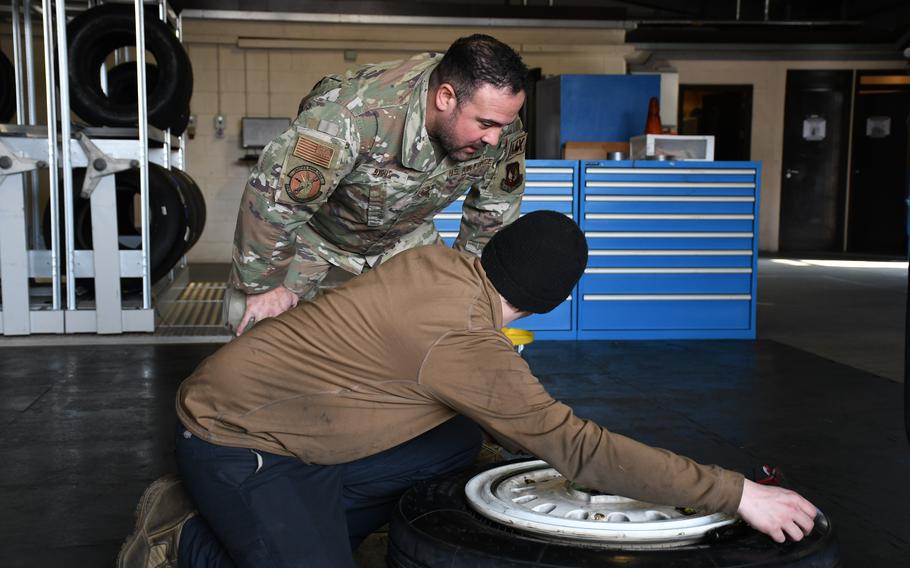
Tech. Sgt. Matthew Byous answers a question from an airman about fixing equipment at RAF Lakenheath, England, March 24, 2022. Byous, a third-generation airman, has been part of a working group seeking ways to help commanders and subordinates better communicate. (Kyle Alvarez/Stars and Stripes)
RAF LAKENHEATH, England — Tech. Sgt. Matthew Byous has felt disregarded by his leaders before, but someone high up was listening when he spoke out on Facebook about suicide prevention.
Now he’s part of an effort to address the issue, and he’s doing so with support from the service’s top enlisted airman.
Late last year, Chief Master Sgt. of the Air Force JoAnne Bass voiced concerns, urging the service’s leaders to head off suicide through “true connection, compassion and being present.” Initially, that sentiment rang hollow for the Lakenheath-based airman.
“You may say this,” Byous wrote in a comment on Bass’ November 2021 post. “But until the front-line supervisors live it. Until squadron and group commanders get real about how their people are treated. It falls on deaf ears to those of us who have watched friends, co-workers and family take their lives.”
Those candid remarks caught the attention of a former supervisor, Maj. Sean Frietag, who invited Byous to a working group that was seeking ways to help commanders better communicate with subordinates.
Earlier this year, the group pitched Bass on a new microsurvey tool known as Foundations, which some believe can help alleviate thorny issues plaguing the force, including suicide.
“I couldn’t be more excited by the work being done on the Foundations program,” Bass said, touting the work of Byous, Frietag and Tech. Sgt. Devan Trammel. “They are transforming the way our airmen provide feedback to help shape their organizations better ... I’d love to see this scaled across the force.”
After working with Trammel, the Foundations program manager, Byous persuaded Lakenheath’s 48th Equipment Maintenance Squadron to become one of over 40 units that have adopted the tool, which aims to create a healthy command climate where airmen feel safe raising concerns and challenging the status quo. It’s been in beta testing for over a year.
The adoption of Foundations by Byous’ squadron came on the heels of the December 2021 death of Airman 1st Class Camden Mello, a crew chief assigned to Lakenheath’s 748th Aircraft Maintenance Squadron who authorities indicated died by suicide.
In a Facebook post about Mello’s death, wing commander Col. Jason Camilletti was unusually forthright, telling airmen that they are loved and important and providing information on suicide prevention.
Byous said the death wasn’t the only suicide locally over the past three years, though Air Force officials in England were unable to provide a number. The deaths have come amid a servicewide push to stop suicides.

Tech. Sgt. Matthew Byous stands in front of a F-35A Lightning II at the 48th Equipment Maintenance Squadron at RAF Lakenheath, England, March 24, 2022. Byous, a third-generation airman, has been part of a working group seeking ways to help commanders and subordinates better communicate. (Kyle Alvarez/Stars and Stripes)
That intensive focus began in 2019, when the Air Force saw both the highest number and highest rate of suicides in recent history. The onset of the COVID-19 pandemic in 2020 sustained that trend.
In April 2021, the service’s resilience director, Brig. Gen. Claude Tudor, called for efforts at all levels of command to find solutions.
In a nod to that all-hands-on-deck call, some proponents of Foundations think the tool could help fight pernicious issues like self-harm and sexual misconduct.
It’s tailored to promote a culture of innovation in the Air Force by strengthening the “psychological safety” a person needs to speak up, which proponents think could call attention to assorted issues earlier.
“This isn’t the silver bullet. I don’t think it fixes everything,” Command Master Sgt. Paul Hammer III said in an April 2021 podcast about Foundations. “But I have to imagine that if the environment is psychologically safe and someone is struggling with something like suicidal thoughts, then they’re more likely to bring that up to someone and seek help.”
Foundations falls under a larger effort called Tesseract, which aims to apply principles from the likes of Google, Amazon and Delta Air Lines to improve logistics and maintenance without added costs or personnel, in part by finding and fixing sticking points in operational processes.
The broader goal is to empower and connect airmen so they can make their workplaces better, which Foundations seeks to achieve by pinpointing issues and providing resources to assist in addressing them.
Questions on the five-minute surveys are based on industry research into what makes good teams. The program scores commands based on surveys conducted every few weeks.

Chief Master Sgt. of the Air Force JoAnne Bass thanks Maj. Sean Freitag, Tech. Sgt. Devan Trammel and Tech. Sgt. Matthew Byous on Feb. 8, 2022, while talking about her support for Foundations. The program aims to create a healthy command climate where airmen feel comfortable raising concerns and challenging the status quo. (Facebook)
The quick microsurveys are Tesseract’s answer to the three-hour commandwide surveys the Air Force does once a year.
Officials don’t have data showing how workplace culture in the Air Force may be linked to suicide, said Trammel, the program manager, but they “hope to get there.”
For Byous, a third-generation airman, implementing the program is about making the Air Force better for those who come after him.
“I fully believe in it,” he said in a recent interview. “I fully believe in Tesseract.”